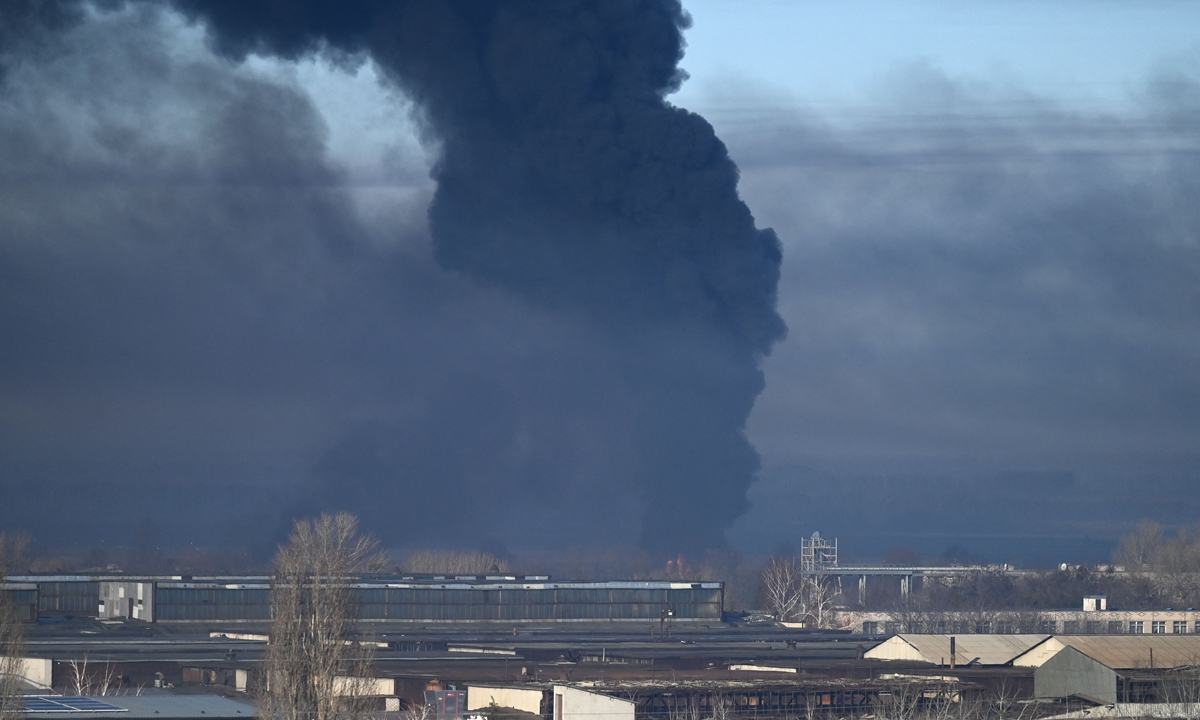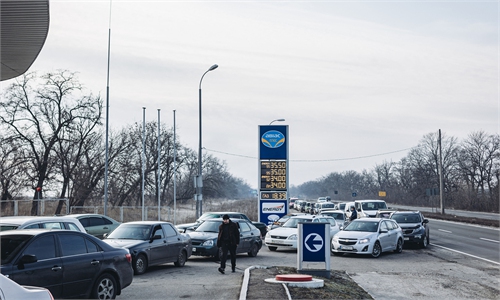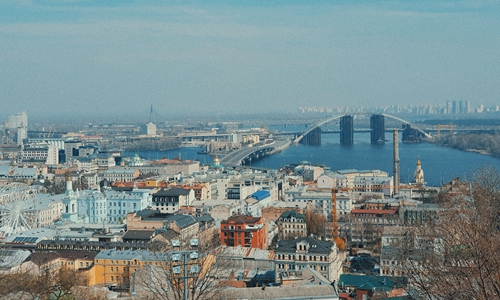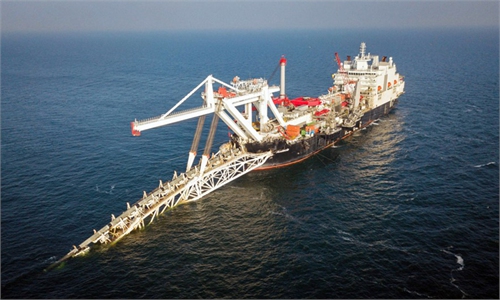
Black smoke rises from a military airport in Chuguyev near Kharkiv on February 24, 2022, after Russian President Vladimir Putin announced a military operation in Ukraine. Photo: VCG
Click here to stay tuned with our live updates on Ukraine tensions.
As some local residents began fleeing Kiev early Thursday morning and rushing west while air raid sirens sounded in the Ukrainian capital, fears of war have grown palpably, catching global media attention and sending the world's markets tumbling, shortly after Russian President Vladimir Putin announced a military operation in the Donbas region.
As world leaders reacted to the quickly escalating Ukraine-Russia crisis, China once again called on the relevant parties to remain restrained and prevent the situation from sliding out of control.
The situation of the Ukraine-Russia crisis has been changing rapidly over the past 24 hours. Putin on Thursday authorized "a special military operation" in the Donbas region, and Ukraine confirmed that military targets across the country have come under attack, according to the Xinhua News Agency.
The operation has been described by the Western media such as Reuters and CNN as a "full-scale invasion," and Reuters called it the biggest attack "by one state against another in Europe since World War II." Explosions have been heard in Ukrainian cities including Kiev and Kharkiv, some media reports said, and Russia also closed all flights to and from 12 airports in the south of Russia.
In less than 24 hours, Ukrainian President Volodymyr Zelensky declared martial law in the country and urged Ukrainians to stay home, and he also announced Ukraine had cut diplomatic ties with Russia. An aide of Zelensky also told reporters on Thursday that more than 40 Ukrainian soldiers and around 10 civilians died in the first hours of Russia's invasion of Ukraine, the AFP reported.
In numerous videos and photos shared by Chinese nationals living in Kiev with the Global Times on Thursday, a heavy traffic jam was seen in the early morning as many local residents fled the city. Some residents started to line up to buy necessities and withdraw money from banks. Chinese Embassy in Ukraine also issued a security alert to Chinese nationals in the morning, asking them to monitor how the situation is evolving, laying out specific issues they should pay attention to in preventing from getting into a dangerous situation.
In response to the quickly evolving situation, the Chinese Embassy in Ukraine issued two security alerts to Chinese citizens and companies in the country within one day. The embassy said although their work and study had been affected, there were no "waves of panic."
"Dark day for Europe" was how some Western media and politicians described the situation, and countries including the US, Germany, UK and Australia criticized the Russian government move. The US and its allies are poised to unveil further sweeping sanctions against Russia, with US President Joe Biden calling the military operation an "unprovoked and unjustified attack."
However, in the eyes of Putin and most Russians, the latest move serves as a counterstrike against the Western squeezing of Russia's security room with extreme measures and a relatively large-scale showdown in wrestling with the US, a view that is also shared by the majority of Chinese.
"Circumstances require us to take decisive and immediate action," Putin's order read. In an address to the public, the Russian president said he wanted to "demilitarize" and "de-Nazify" Ukraine, Russia Today said. Putin further said, "We have no plans to occupy Ukrainian territory."
"Demilitarize" could be understood to be putting down arms and surrendering, which can also be understood as incapacitating the opponent and rendering them unable to form a threat in a broader sense, Song Zhongping, a Chinese military expert and TV commentator, told the Global Times on Thursday.
"As a result, Russia will completely destroy the heavy weapons of Ukrainian troops, including warplanes, tanks and armored troops as well as defense forces, such as air defense missile forces and the navy," Song said.
Russia announced it has destroyed Ukraine's airfields, air defenses and control systems just a few hours after it launched the military operations.
"And as we take the measures announced by the president to ensure the security of the country and the Russian people, we will certainly always be ready for a dialogue that will return us to justice and the principles of the UN Charter," Russian Foreign Minister Sergei Lavrov said late on Thursday.
Yury Tavrovsky, head of the "Russian Dream-Chinese Dream" analytics center of the Izborsk Club, told the Global Times that Russia's military operations in Ukraine are "completely legal."
Both chambers of Russia's Duma (parliament) had earlier approved recognition of Donetsk and Lugansk as "independent states." The Upper Chamber (the Senate) later approved use of armed forces outside the national borders, Tavrovsky explained.
The military operation was launched just one day after the US and Europe unveiled what is believed to be just the first round of sanctions against Russian individuals and institutions in response to Putin's signing of two decrees recognizing Lugansk and Donetskas independent and sovereign states.
As global markets tumbled steeply over the Ukraine-Russia crisis, some raised questions as to why Russia took this step, how the situation will evolve and whether the US will engage in a direct war with Russia.
Moscow's motivation
In a phone call with Chinese State Councilor and Foreign Minister Wang Yi on Thursday, Russian Foreign Minister Sergey Lavrov explained the development of the Ukraine situation and Russia's position, saying that the US and NATO violated their commitments by expanding east, refused to implement the new Minsk Agreements, and violated UN Security Council Resolution 2202, forcing Russia to take necessary measures to safeguard its own rights and interests.
Noting that China has always respected the sovereignty and territorial integrity of all countries, Wang said that China recognizes the complex and special historical context of the Ukraine issue and understands Russia's legitimate security concerns.
China maintains that the Cold War mentality should be completely abandoned and a balanced, effective and sustainable European security mechanism should be finally established through dialogue and negotiation, Wang said.
"China believes there should be mutual cooperation and sustainable security, and the reasonable security concerns of all parties concerned should be respected and solved," Hua Chunying, spokesperson of the Chinese Foreign Ministry, said during a press conference on Thursday.
China hopes all parties will not shut the door on peace, but continue negotiations and try to ease the situation as soon as possible, she said.
Some Chinese observers said the US has continued its intensive containment of Russia, for example, by implementing more sanctions, finally forcing Russia to try to realize its security demands in this drastic way.
Russian elites such as Putin and Deputy Chairman of Russian Security Council Dmitry Medvedev believe that the Ukraine issue has reached the point where it must be resolved.
"I believe Russia's military operation is a reaction by Moscow to Western countries' exertion of pressure on Russia for a long time, showing that Moscow can't tolerate it anymore," Yang Jin, an associate research fellow at the Institute of Russian, Eastern European, and Central Asian Studies under the Chinese Academy of Social Sciences, told the Global Times on Thursday.
"As to how the situation will evolve, I think we need to spend more time to observe it. First thing first, we need to focus on the attitude of the US, on whether Washington will launch a direct war against Russia," he said, noting that everything depends on how NATO and the US will react.
If the entire military operation goes smoothly, Russia could reach its target of fully controlling Ukraine, and what worries NATO most is whether Russia will then carry out further operations again the three Baltic countries, namely Estonia, Latvia and Lithuania, Li Haidong, a professor from the Institute of International Relations of China Foreign Affairs University, told the Global Times on Thursday.
The US and NATO are now observing how the situation evolves. The US and NATO have been training Ukraine troops since 2014, and it's time to see if they will confront Russian troops and for how long they will fight them. "As long as Russia does not engage in military conflicts with NATO members, there won't be direct confrontation between NATO and US [on one side] and Russia [on the other]," Li said.





